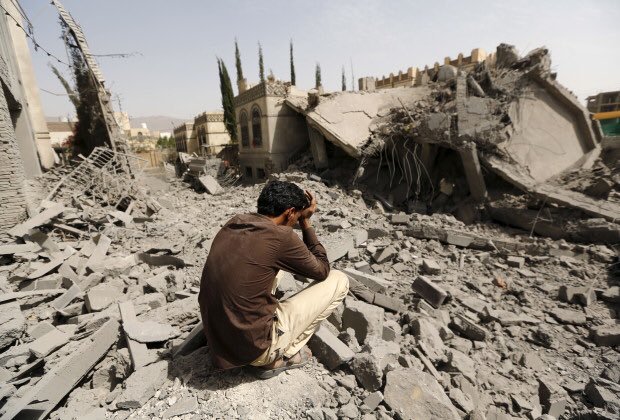Khaled Abdullah/Reuters
By
Rupen Savoulian
This month marks two full years since the start of the Saudi-led, US-supported war on Yemen. As this war completes two years, involving a blockade of Yemen and the consequent collapse of the nation’s economy, the prospect of famine is now appearing very real.
The International Committee of the Red Cross, as reported by Al Jazeera, stated the Yemen is currently only a few months away from a famine. Food, medical supplies, electricity – the Yemeni population is facing critical shortages of basic necessities, and this situation threatens to lead to famine.
Earlier in March 2017, the United Nations warned that Yemen, along with Somalia, South Sudan, Kenya, and the Horn of Africa, face famine-conditions that affect the lives of 20 million people. Without a collective and coordinated effort, millions face the likelihood of starvation and malnutrition, with all the consequent humanitarian problems that those conditions produce. In Yemen today, millions are at risk of starvation, especially children, as shortages of basic necessities worsen as the Saudi-led war escalates.
Let us be clear: this tragic situation is the direct consequence of the Saudi offensive against the country of Yemen, and this military campaign is fully supported by the United States and Britain. In an article for Dissident Voice by Kathy Kelly, elaborating on the man-made famine in Yemen, Kelly writes that:
After years of U.S. support for dictator Ali Adullah Saleh, civil war has wracked Yemen since 2014. Its neighbor Saudi Arabia, itself among the region’s cruelest dictatorships and a staunch U.S. ally, became nervous in 2015 about the outcome and, with support from nine regional allies, began subjecting the country to a punishing barrage of airstrikes, and also imposed a blockade that ended the inflow of food and supplies to Yemen through a major port. This was accomplished with massive, ongoing weapons shipments from the U.S., which has also waged independent airstrikes that have killed dozens of civilians, including women and children.
Kelly writes that Unicef is estimating that 460,000 children face severe malnutrition in Yemen. Pregnant and lactating women, themselves bearing the consequences of malnutrition, cannot adequately provide the necessary nutrition for their children, thus increasing the likelihood of malnutrition-induced diseases and conditions in the succeeding generation. The devastating consequences of child malnutrition in Yemen was documented by Unicef here; food insecurity leaves life-long impacts on those affected.
It is interesting to note, in this context, that Yemen is actually a major destination of African refugees, and in particular Somalis. As we in Australia continue to respond with punitive measures to the relatively small number of refugees that arrive on our shores, Yemen took in 117,000 new refugees during 2016. As a contrasting example, Australia received 13,756 over the 2014-15 period. Australia is hardly facing a deluge of desperate refugees; it is the poorer countries that take the bulk of asylum seekers.
A militarised response to the refugee outflow is becoming a normalised reaction on the part of imperialist countries. Earlier in March 2017, a boatload of Somali refugees, fleeing from Yemen and going to the relative peace of the Sudan, was blasted to pieces by an Apache helicopter gunship. The boat of Somali refugees was 30 miles off the Yemeni coast; at least 42 people were killed and dozens wounded. No government or organisation has claimed responsibility for the attack.
It is relevant to remember that the Saudi offensive, which involves the heavy aerial bombardment of Yemen, has escalated in recent months. Saudi Arabia and the associated Gulf petro-monarchies, have been waging a military campaign in Yemen to support their preferred politician, Yemeni President Abdrabbuh Mansur Hadi. The Saudi-led coalition, supported with the full backing of Washington and London, have been carrying out this war to suppress the rebel Houthi movement, a militarised Shia politico-military force that has seized much of the country.
The United States has assisted this war, since former US President Barack Obama threw in his lot with the Saudi kingdom. The latter, one of the cruelest dictatorships in the world, has received a constant supply of weapons and munitions from the United States. In fact, Obama has the dubious distinction of actually increasing weapons sales to the monarchist dictatorship in Riyadh, thus ensuring that the Wahhabist kingdom could launch and continue its offensive in Yemen. The naval blockade of Yemen, enforced with the assistance of the US Navy, has contributed to bringing that nation to the brink of famine. The support for Saudi Arabia from the United States, in the form of logistics, intelligence-gathering, aerial refueling and military resupply, exposes the predatory aims and ambitions of American finance capital and undermines its claims to be a force for peace in the world.
The United States began its own war on Yemen back in 2009, when former US President Barack Obama authorised the use of aerial drone strikes in the country. This drone warfare was notionally launched to combat the presence of Al Qaeda in the Arabian Peninsula (AQAP); however, the main targets of this warfare have been Yemeni civilians. Obama escalated and perfected the tactic of drone strikes during his administration, and he allocated to himself the right to order the assassination of anyone he deemed to be a member of, or associated with, AQAP.
Back in 2011, Obama ordered the killing of American citizen and Yemeni cleric Anwar al-Awlaki, on the basis of Awlaki’s alleged affiliation with Al Qaeda. The United States, when attacking targets in Yemen, routinely dismiss civilian casualties and victims of US drone attacks as ‘Al Qaeda militants’. This drone programme is now in the hands of current American President Donald Trump.
Patrick Cockburn, veteran foreign correspondent for The Independent, writes that President Trump has escalated America’s involvement in the Yemen war, carrying out multiple air strikes across that country over the last month. Increasing its military support for Saudi Arabia, the new US administration is continuing where Trump’s predecessor left off. While the United Nations has been warning that Yemen, along with countries in the Horn of Africa, constitute the gravest humanitarian crisis faced by the world since 1945, Trump has increased American support for the Saudi war. Cockburn writes that:
But at the very moment that the UN is warning about the calamity facing Yemen, the US State Department has given permission for a resumption of the supply of precision guided weapons to Saudi Arabia. These sales were suspended last October by President Obama after Saudi aircraft bombed a funeral in the capital Sana’a, killing more than 100 mourners. Ever since Saudi Arabia started its bombing campaign in March 2015, the US has been refuelling its aircraft and has advisors in the Saudi operational headquarters. For the weapons sales to go ahead all that is needed is White House permission.
This bombardment of Yemen is part of the as-yet undeclared American war on Yemen, in addition to the January 2017 Navy SEAL attack that killed the eight-year old daughter of the late Anwar al Awlaki. The January raid, ostensibly undertaken to attack an AQAP training camp, resulted in a fire fight, the deaths of at least 25 Yemeni civilians, the destruction of an American aircraft, and the death of a US Navy SEAL, Chief Petty Officer William ‘Ryan’ Owens. During his address to Congress, Trump cynically exploited the death of Owens, using the grief of Owen’s widow to drum up support for this illegal and criminal Yemen war. The cameras focused on Carryn Owens, and media commentators gushed with feigned sympathy for her grief. No mention was made of the tears of the Yemeni civilians, who have to endure this war in their daily lives. As Glenn Greenwald stated in his article for The Intercept;
This is standard fare in U.S. war propaganda: We fixate on the Americans killed, learning their names and life stories and the plight of their spouses and parents, but steadfastly ignore the innocent people the U.S. government kills, whose numbers are always far greater. There is thus a sprawling, moving monument in the center of Washington, D.C., commemorating the 58,000 U.S. soldiers who died in Vietnam, but not the (at least) 2 million Vietnamese civilians killed by that war.
Australia’s studious silence about the US-supported destruction of Yemen has to be broken – the Turnbull government, through the person of the Foreign Affairs minister Julie Bishop, has been a cheerleader for Saudi Arabia for far too long. The false equivalence of condemning both the Saudi regime and the Houthi rebel opponents must also be abandoned. The Shia Houthi movement – the Ansar Allah – have been dishonestly stigmatised as proxies of Iran. The Houthi rebels have received support from Tehran – but that support has been largely rhetorical. The culpability of Riyadh, Washington and London for bringing Yemen to the brink of famine cannot be disguised by allegations of Iranian perfidy.
The role of Australian mercenaries fighting in support of the Saudi military cannot be ignored. Sent by the United Arab Emirates to Yemen, Australian mercenaries – foreign fighters – have actively assisted the Saudi-American offensive. While the activities of Australians fighting in Syria in support of Jabhat Al-Nusra or ISIS have received extensive media scrutiny, the role of Australians in Yemen – foreign fighters – has barely been mentioned. Yes, Jabhat Al-Nusra and ISIS are terrorist groups. But that leaves us with the question – do not the military actions of the American-backed Saudi war on Yemen amount to an act of collective terrorism?



No Comments Yet!
You can be first to comment this post!